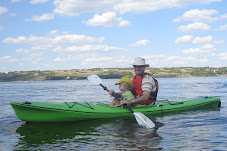I've just finished a workshop about using blogs and wikis in the language classroom with some very motivated English language teachers. There were some excellent ideas from the group, and some important issues got raised as well. This was a very interesting group with a pretty good understanding of how the web works, and I hope that they will be able to go on and use blogs/wikis in their teaching.
UPDATE: One of the teachers has already got his blog started - have a look at Mr. Maxwell's lessons...
Some interesting issues raised:
1. Students are already enthusiastically blogging: can we harness that for our own purposes?
I would hope that some of the enthusiasm that they feel for their own blogging would spill over into the blogging that they do for their class. I can't stress enough the importance of setting out some ground rules, as this teacher has done, so that students understand the purpose of their blogging, and understand related privacy and ethical issues.
2. If you create a wiki, does that mean that anyone in the class can edit anything?
It basically does. But my experience is that people tend to need encouraging to edit, not the other way around. Once again, setting out ground rules for how you expect students to go about editing, addressing ethical issues and so on, are essential. You can see an example of this here, and covering related issues here. Of course, you would need to think about your own context and negotiate a policy with your students.
3. How can we create and use multimedia in blogs?
Once students get past a certain level, they will be able to teach you this (which might seem a bit scary if you like being in charge). Blogger has an add video function, and it is also very easy to add video that you have uploaded to Googlevideo, Youtube or Teachertube. There are lots of different ways to create multimedia, ranging from simple slideshows with audio to edited movies. Here are some useful links:
Online video for learning: A comprehensive list of online tools that you can use to edit and share video online
Jumpcut: Online video editor
Voicethread: Audio narrated slideshows with audio comments from listeners
Windows Movie Maker and Apple's iMovie can also be used to create movies. Because so many people and institutions use Windows, I guess you will want to use that (sorry Mac users, but you probably already know how to use iMovie don't you?). Feel free to browse the animations below to get some idea of how Moviemaker works:
How to import media into a Windows Movie Maker project
How to add a title frame to a Windows Movie Maker project
How to clip a movie in Windows Movie Maker
How to add a transition in Windows Movie Maker
How to export a project from Windows Movie Maker
A nice idea for a project:
One teacher suggested that students could work in groups to create travel brochures for different countries around the world, each group adding the work to a different section of a wiki. A project like that would allow students opportunities for peer and self correction (as well as teacher feedback) using the discussion function of the wiki.
If you have any questions, comments or suggestions, please feel free to respond below.
Subscribe to:
Post Comments (Atom)

3 comments:
Wow, this idea is very great. It reminds me of the experience of learning English for Tourism in university. The teacher asked us to do oral presentation with assistance of PPT talking about beautiful tourist places all over the world. Although I enjoyed all the presentation, I didn't seem to learn much English for Tourism. I think maybe it is because that we students abandoned ourselves to the beautiful pictures and dreamed about traveling to those fantastic places that we paid little attention to the language. A collabortive work to work out a travel brochure may propel students to pay attention to the use of language as well as broaden their view.
Maybe something you would like to try out too?
Yes. Just as I mentioned in class yesterday, I think maybe students can edit the travel brochure by e-book compiler software which then can entail lots of beautiful pictures and delicate fonts of words and can be better preserved over time and distributed among learners even in other classes. I remembered when I was in my junior high school teachers asked us students to edit English newspaper manually. I worked hard to draw and write on an A2 paper. The work was luckily selected by the teacher to be paste on a blackboard for show but was unluckily ruined along with the time. Nowadays technology does provide much expediency for language learning and teaching. It is a pity if teachers stay bigoted with their conventional teaching approaches and do not try to apply CALL in language teaching.
Post a Comment